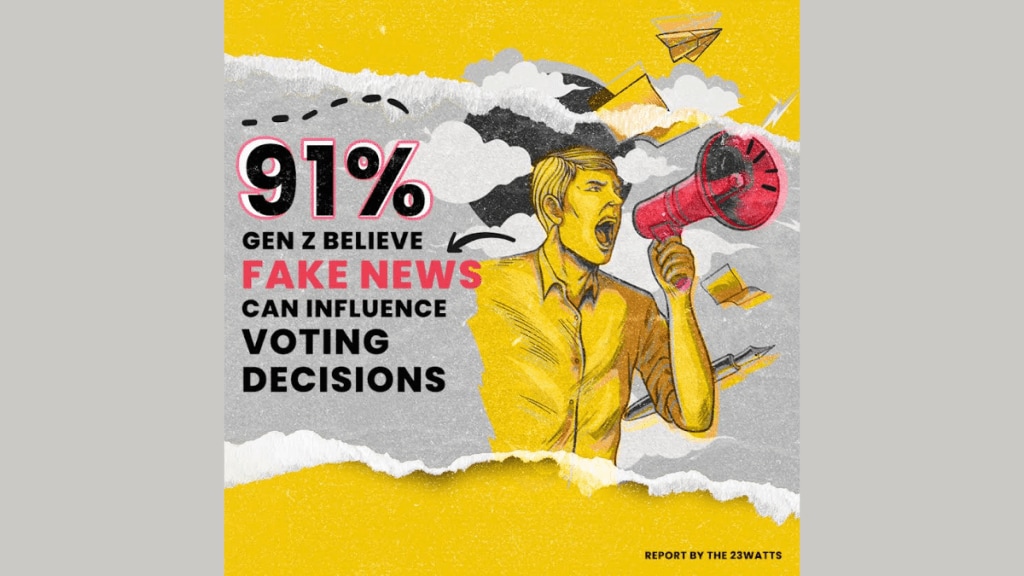The communication consulting firm, The 23 Watts, recently released a report titled ‘Truth Be Told,’ which delves into the complex relationship between Delhi’s youth, particularly Generation Z (Gen Z), and the pervasive issue of misinformation. The report is based on a survey involving over 1,200 respondents under 25 years old from the Delhi-NCR region.
One of the significant observations highlighted in the report is the surge in fake news consumption during national events such as elections, with a notable 90% of respondents acknowledging this trend. This finding is particularly concerning as it underscores the susceptibility of young individuals to misinformation during critical junctures of societal decision-making.
Moreover, the report reveals that 91% of respondents believe that fake news has the potential to sway voting decisions. This sentiment reflects a growing awareness among the youth regarding the impact of misinformation on democratic processes and political outcomes.
The report also sheds light on the behavioural patterns of Delhi’s youth regarding fake news. Around 80% of the surveyed population admits to altering their perceptions and opinions based on the influence of fake news. This finding underscores the significant role that misinformation plays in shaping individuals’ views and beliefs, often leading to distorted understandings of reality.
Furthermore, the report highlights that 59% of respondents tend to fall into the trap of sensationalised content, which frequently contributes to the dissemination of fake news. This inclination towards sensationalism indicates a vulnerability among young individuals to emotionally charged or provocative information, regardless of its factual accuracy.
Despite a high percentage (95%) claiming to authenticate news, a concerning 45% of respondents have shared unauthenticated news later found to be false. This discrepancy between intent and action underscores the challenges in effectively combating fake news, despite individuals’ stated efforts to verify information.
In terms of information verification practices, only 29% of individuals rely on fact-checking websites, indicating a need for greater awareness and utilisation of reliable sources for news authentication. This finding emphasises the importance of promoting media literacy and critical thinking skills among youth to discern credible information from misinformation.
Additionally, the report reveals that 62% of Delhi’s Gen Z population perceives fake news not only as a distortion of reality but also as a tool for manipulating and damaging reputations. This perception underscores the broader societal implications of fake news beyond individual belief systems, highlighting its potential to disrupt social cohesion and trust.
In response to the prevalence of fake news, 89% of respondents believe that the government should take more proactive measures to address this issue, with 69% advocating for stricter policies. This widespread call for government intervention reflects a growing demand for regulatory frameworks that can effectively curb the spread of misinformation and safeguard public discourse.
Finally, the report notes that approximately 66% of Gen Z rely on internet portals such as YouTube, social media platforms, messengers, and online articles for news consumption. This heavy reliance on digital platforms underscores the need for responsible content moderation and algorithmic transparency to mitigate the proliferation of fake news within online ecosystems.
“Born into technology and raised with information at their fingertips, Generation Z is redefining political movements, religion, pop culture, national events, and more. With fake news being at the forefront of all major happenings in the nation, through The 23 Watts Insights Studio, we wanted to understand this shifting focus. The core of our effort is to map and mine the minds of the loud and proud Gen Z to understand the lasting shift in news consumption and the spread of misinformation,” Tarundeep Singh, chief growth officer, The 23 Watts, said.
The primary research also highlighted that 14% of Delhi Youth tend to share sensational news, without fact-checking, and only based on conjectures. All findings from the report tie back to how the high on hashtags Gen Z is on the loose, and easily swayed by their feed.
“This research explores these themes in detail with an ideal balance with the Quantitative approach needed for a piece of reliable empirical evidence and equally complemented by in-depth insights unlocked through qualitative research to understand motivations and behaviours. It’s an evolving area of research and this is an attempt to demystify the larger community. I am sure it will unlock more and more such unknowns in its immediate future iterations,” Vijay Ganesan, former director-analytics & data strategy, Europe, Kantar said.


